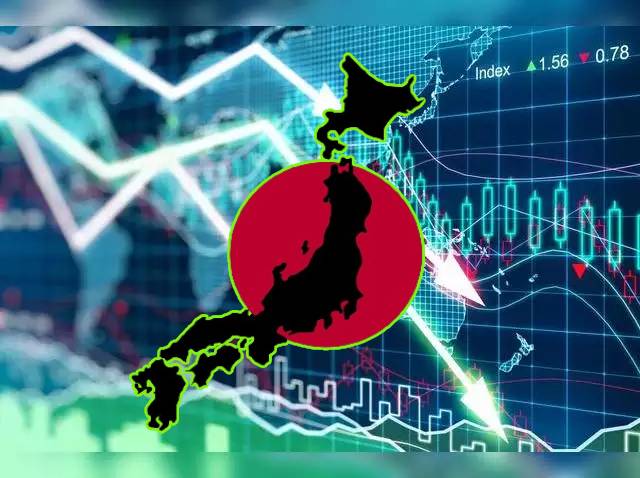
- Japan’s economy is plagued by demand deficiency that has persisted due to various factors, including low consumer spending and restricted credit flow stemming from banking sector troubles.
- The reluctance of Japanese economic policymakers to embrace aggressive monetary measures can be attributed, in part, to lingering trauma from past economic bubbles and subsequent busts.
- As a key trading partner and investor, Japan’s economic slowdown could potentially dampen demand for Indian exports across vital sectors like automobiles, electronics, and machinery.
- Japan’s recession could also possibly lead to a reduction in its investments in India, thereby impacting job creation and economic growth.
Japan encountered an unexpected economic setback, slipping into recession due to weak domestic demand. The country’s GDP contracted by 0.4% in the final quarter of last year, marking a second consecutive quarterly decline. This decline has pushed Japan behind Germany, now ranking as the fourth-largest economy globally. The recession is largely driven by persistent reductions in both household and business spending over the past three quarters. While market expectations had leaned towards positive growth, the actual contraction has prompted a reassessment of the timeline for potential monetary policy changes.
Economists note that this setback poses a significant challenge for the Bank of Japan, as it complicates the path toward policy normalization. Despite discussions surrounding a potential rate hike, the central bank has emphasized the need for continued accommodative measures to support financial conditions.
The Problem with Japanese Economy
Japan’s economic stagnation over the past few years has raised concerns globally, prompting discussions on the root causes and potential solutions. While it’s true that there is a list of issues often cited, such as a weak financial sector, over-regulation, lack of competition, and relocation of production, these alone do not provide a comprehensive analysis of the situation.
At the heart of Japan’s current economic woes lies a fundamental imbalance between supply and demand. Despite having ample production capacity, the economy is plagued by insufficient demand. This demand deficiency has persisted due to various factors, including low consumer spending and restricted credit flow stemming from banking sector troubles.
Addressing the demand shortfall requires bold and decisive action. Contrary to popular belief, there are viable options available beyond the conventional wisdom of structural reforms. One such option is a significant increase in the money supply by the central bank, commonly known as quantitative easing (QE).
Critics often argue that the Bank of Japan has exhausted its monetary policy tools, given the already low-interest rates and fiscal constraints the government faces. However, this viewpoint overlooks the immense potential of QE to stimulate spending and investment directly or indirectly. By purchasing government debt and injecting liquidity into the economy, the central bank can incentivize lending, boost consumer spending, and pave the way for fiscal measures aimed at revitalizing economic activity.
Concerns about inflationary pressures stemming from QE must be weighed against the immediate need to address the demand gap. While excessive money printing can lead to inflation if spending surpasses the economy’s production capacity, the current scenario of subdued consumer confidence suggests a low risk of runaway inflation.
The reluctance of Japanese economic policymakers to embrace aggressive monetary measures can be attributed, in part, to lingering trauma from past economic bubbles and subsequent busts. However, clinging to outdated fears risks exacerbating the current economic challenges rather than alleviating them.
Impact on India
The recent recessionary downturn in Japan’s economy poses multifaceted implications for India’s economic landscape. As a key trading partner and investor, Japan’s economic slowdown could potentially dampen demand for Indian exports across vital sectors like automobiles, electronics, and machinery, while also possibly leading to a reduction in Japanese investments in India, thereby impacting job creation and economic growth.
Moreover, fluctuations in the value of the yen against the Indian rupee could influence India’s import costs, particularly for commodities such as oil and gas. Additionally, the interconnected nature of global financial markets means that volatility stemming from Japan’s economic challenges could reverberate through Indian equities and investment flows.
Furthermore, given Japan’s prowess in technology and innovation, any slowdown in R&D spending or innovation initiatives could indirectly affect India’s tech sector, disrupting collaborations, technology transfers, and knowledge sharing. Thus, while the direct impact of Japan’s recession on India may be relatively contained compared to other economies, the interconnectedness of the global economic ecosystem underscores the importance for Indian policymakers and businesses to closely monitor and adeptly navigate these developments.
References:
- https://www.cnbc.com/2024/02/15/japan-loses-spot-as-worlds-third-largest-economy-to-germany.html
- https://www.thestatesman.com/opinion/japan-in-recession-1503270561.html
- https://timesofindia.indiatimes.com/blogs/voices/global-financial-crisis-and-its-impact-on-the-indian-economy/
Aayush Pal is a freelance writer on contemporary geopolitical developments. The views expressed in his work are entirely his own.

The article rightly highlights Japan’s economic woes, citing persistent demand deficiency, low consumer spending, and banking sector troubles. The reluctance of Japanese policymakers to adopt aggressive monetary measures is linked to past economic bubbles. The author has very well highlighted the potential impact on India which includes reduced demand for exports and a potential decline in Japanese investments, affecting job creation and economic growth. Indian government has to recalibrate its economic polies in light of recession in Japan, UK and other countries.
The downturn in Japanese economy is concerning but even more concerning is its impact on India. A very important article and I hope the economic planners are taking due measures to mitigate the impact.